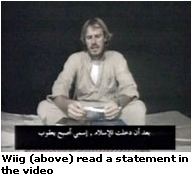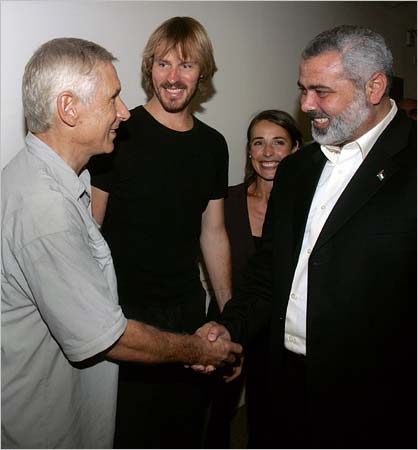
| THINK-ISRAEL |
| HOME | March-April 2007 Featured Stories | Background Information | News On The Web |
The political economics of kidnapping foreign journalists and photographers
The Durmoush family from Gaza has developed a new innovative source of income for itself: Kidnapping foreign journalists for ransom. A captive can bring in as much as $2 million. Alan Johnston, a BBC correspondent, already two and a half weeks in captivity, is the 15th victim of the Gaza Strip's hottest economic branch.
For the last three years the Gaza Strip has been a hothouse for the kidnapping of foreign journalists. Payment for their release can reach as much as $2 million. The Durmoush family, implicated in the abduction of Gilad Shalit, has monopolized the trend in Gaza, with the help of local photographers who assist in the kidnapping of their foreign colleagues who encroach on their territory. As of Wednesday, British citizen Alan Johnston counted 17 days as a hostage.
Money, territorial control, copycatting and some degree of honor are the four factors moving the wheels of the latest trend of foreign journalist kidnappings in the Gaza Strip. It all started in September 2004 with the abduction of Israeli journalist Riyadh Ali, who worked as a producer for CNN. Three years have passed and in recent days BBC Gaza correspondent Alan Johnston has become the 15th victim. For a good number of years, journalists have become easy targets in various regional conflicts. The recent war in Iraq has cost the lives of dozens of journalists. Some were killed simply because they were caught in the midst of battle, others were kidnapped and brutally murdered for ideological reasons by activists from extremist organizations. The remainder were kidnapped for extortion. Gaza, like Iraq in the days following the downfall of Saddam Hussein, is one big chaotic mess. Unlike Iraq, abducted journalists are not in immediate danger. In most cases the opposite is true. If the respective news agency promptly pays the ransom, victims are released within days and even hours.
On the kidnapping field of Gaza, two main players are involved. The first player is the Durmoush family, implicated in the kidnapping of Israeli soldier Gilad Shalit and presently holding Alan Johnston. The second player is a spontaneous amalgamation of local Gaza photographers. The presence of the foreign photographers takes a bite out of their tremendous monthly incomes, not just in Gaza economic terms. All analysis of the Gaza kidnapping phenomenon leads to one conclusion: This is an incredible economic pipeline that pays its perpetrators very large profits. Among the journalists it is said that $2 million changed hands in the release of two employees from the Fox network, in August 2006. "No such thing occurred", a Fox network senior official flatly denied, "The kidnappers did not receive a thing." Despite Fox network's denials, somebody is growing fat and wealthy from this new lucrative profession.
With the Americans, everything is done on a large scale. When news spread of the kidnapping of American correspondent Steve Centanni and New Zealand photographer Olaf Wiig from Fox News, tens of black jeeps filled with serious-looking types, entered Gaza. The idea behind the massive show of force was to demonstrate to the kidnappers that the abductees had the support of the American intelligence agencies. But that didn't help one bit. Some say that the bombastic display only served to delay the journalists' release. A few days later, after consultations, the plan of action changed completely. Authorization to negotiate with the kidnappers was transferred to elements in the Palestinian Authority (PA). Following nine days of silence the kidnappers demanded the release of Muslim prisoners held in the United States. The response by the Americans was predictable, no negotiations with terrorists. In the meantime Fox tried to recruit the help of Israeli field correspondents who have ties in the PA and other contacts in the field, but to no avail. A few days later the kidnappers released a video in which Centanni and Wiig were shown converting to Islam live. On the 14th day they were released in spite of the fact that their original demands were not met and the grandiose show of force was withdrawn within a short period of time. It is a wonder what convinced the kidnappers to release they captives? A rhetorical question, of course.



Since the incident, Fox's security regulations have changed. The network refused to give details of their new procedures. "For now we have no permanent crew in the Gaza Strip," said a senior Fox official, "We do not have a permanent crew, nor did we have one prior to the kidnapping. The crew was there for a period because the ongoing situation warranted it. If there is a special reason we send a crew, whether for a week or a day. Regarding regulations, I am not interested in expanding. Either way, there are always concerns when going to Gaza."
Tomorrow was to be Johnston's last day in Gaza. During his three years in Gaza the veteran journalist made many friends. Since last years' kidnapping of the people from Fox news, few media organizations station permanent correspondents and photographers in the Gaza Strip. If once a correspondent would cover Gaza and live amongst its citizens, today the case is totally different. The journalist sits in Jerusalem, or any other secure city, and ventures to Gaza only when an incident necessitates the risk. Johnston, who covered Afghanistan and Uzbekistan for the BBC, insisted on residing in Gaza. His case is unusual not only for his living in Gaza during a period of bedlam and lawlessness against journalists. Wednesday marked 17 days of Johnston's captivity, making him the longest held journalist. In addition, his kidnapping made great waves amongst Palestinian journalists. Since his kidnapping, two demonstrations have been held by journalists calling for his release, one in the West Bank, the other in Gaza. On Tuesday, all Gaza radio stations broadcast an hour devoted to Johnston.
The British learned from the pompous entrance of American intelligence agents, and when the kidnapping was verified, started to take quiet action. In the present kidnapping incident, the MI5 are involved; negotiations experts; Security personnel; and UNRWA workers who have been in Gaza for some time. In addition, senior BBC officials have been arriving during the last two weeks. The operation is being handled in secrecy. Other than the BBC and the involved intelligence organizations, no one knows what is happening behind the scenes. The advantage of the British, as opposed to other organizations that have had workers kidnapped, is their exceptional relations with, and support among, the Palestinian journalists. Most of the negotiations are being handled by people in the PA.
"There is almost continuous contact between the kidnappers and people in the field", explains Israel Television Channel 10's Zvi Yehezkeli about the conduct of affairs between tippers, fixers and clansmen. One knows people, the other knows family and, most importantly, elders and dignitaries who speak to the hearts of the kidnappers are enlisted in the effort. BBC people are not in direct contact with the kidnappers."
"Our contacts are with local politicians who will arrange the release," explains Fran Unsworth, head of BBC newsgathering. "We have various crews in Gaza assisting us. Local journalists initiated a campaign for Alan, are helping very much to secure his release."
Q: "Can you confirm that he is being held by the Durmoush family?"
"I cannot say who is holding him and why."
Q: "Have the kidnappers contacted you?"
"We are not involved and nobody has turned to us."
Q: "Can you say why it is taking so long?"
"I cannot say why this is taking so long because we have no information on
who took him. I can only say that the situation is very fragile."
Q: "Are you concerned for his life?"
"I am optimistic that they will not kill Alan, also because there have never
been such killings in Gaza."
As noted, these were due to be Johnston's last days in Gaza. If he had not been kidnapped, it is reasonable to assume that he would have been replaced by another correspondent who would have become a resident of the Gaza Strip. The kidnapping threw a monkey-wrench into the works. "We must think about returning a correspondent to the field," Unsworth continues, "We have to bring the story to our public but we have yet to decide how to act." One of the main reasons why Johnston is being held captive beyond the norm stems from a change in perception by senior PA officials. Since Johnston's abduction, the PA has hardened its negotiating stance. Since the kidnapping of journalists became an epidemic, the name of the PA has been harmed. Today, it is understood in the PA that abducting journalists contradicts their interests. As a preventive step, PA negotiators have become more unyielding so that such events do not recur.
In the last two years, media personnel claim that local journalists, mainly photographers who reside in Gaza, have become active partners in the kidnappings in order to maintain their livelihoods. Almost half of the abductees are photographers, both stills and video. According to one Israeli photographer who has spent more than a little time in Gaza, the reason for this is clear.
"A local photographer who freelances for an agency can make much more than a hired photographer who arrives from overseas," he explains, "For example, you know the photos of armed men burning the picture of the new Chief-of-Staff? The photographers from Gaza staged this photo and sold it afterwards to the same agencies. A good photo from Gaza is worth several hundred dollars. Such a photographer could make $6-8,000 a month. As soon as a foreign photographer arrives and begins to move around, he takes away a local photographer's livelihood. The agencies understood that it pays more for them to send a hired photographer than to buy photos from a local photographer. After most of the agencies began to send hired photographers, there was a rise in the number of abducted photographers. I have no other explanation."See, this couldn't work on the West Bank because there isn't the same number of events there, people are interested in Gaza. Photographers have a lot of work in Gaza. From a practical point-of-view, kidnappings are almost impossible on the West Bank due to the distances between the cities. The organizations are dispersed among the various cities and they are not as strong as they are in Gaza. In the West Bank, at most they threaten and try to frighten foreign correspondents. In Gaza, they have no problem speaking to the Durmoush family and arranging for the photographer to be abducted. In the meantime, this is paying off for them because fewer and fewer photographers are entering Gaza."
On the first day of 2007, the Peruvian Jaime Razuri, who photographed for AFP, was abducted. In contrast to other instances in which photographers were abducted, Razuri was kidnapped because he was in the wrong place at the wrong time. On the same day, there was a battle between the Durmoush family and Iz A-Din El-Kassam personnel from Hamas's military wing. Members of the Durmoush family were holed up in a certain area and had deployed snipers. Hamas had ordered its force to eliminate the Durmoush family. As soon as the family heard about the other side's intentions, they kidnapped Razuri and told the enemy commanders that they had a human shield. At the same time, they succeeded in foiling a Hamas action and the battle was halted. Razuri was released after six days.
"The positive aspect of the abductions is that there is no ideological base like there is in Iraq," the photographer continues, "A kidnapping in Iraq could be perpetrated by an ideologically screwed-up nut looking to make a name for himself by murdering someone. In Gaza, it's all a matter of money, except for the Razuri incident. Razuri is a vegetarian and when his abductors brought him meat, he refused to eat it and they saw to it that he had vegetarian food. They have no intention of harming the abductees because in the end, they want the money and maybe to instill a little fear."
In the meantime, there is a storm over the kidnappings. On the Palestinian street, they have understood that nothing good comes out of this, on the contrary. Their image in the eyes of those who bring the stories to the world is harmed. Moreover, in their view, a journalist who covers Gaza from inside always presents their view better.
"From the Palestinian people's point-of-view, the abductions adversely affect the coverage, according to Abd Al-Askar, who represents several foreign media organizations in Gaza and is close to Muhammad Dahlan, "The kidnappings cause major damage because foreign journalists are scared to come to the Strip. Since the kidnapping of the two Fox journalists, I see much less presence by journalists. Those who arrive are becoming scarce and even they try not to remain in the place for more than a few hours at a time."
Q: "But it is said that journalists from Gaza are involved in the kidnappings."
"That's bullshit. Johnston is a friend of the Palestinian journalists. There is a ban on kidnapping journalists because the more foreign journalists there are in Gaza, the better and more accurate the delivery of our story is. One cannot compare between a journalist who covers Gaza from the inside and lives in the city and a journalist who sits in Jerusalem or someplace else and comes occasionally. When you are in Gaza, you get a feel for the place and its people and you know what is really happening."
Q: "I assume that you fear that foreign journalists will become less pro-Palestinian in the wake of the kidnappings."
"It is not at all a question of being pro-Palestinian or pro-Israeli. A journalist must maintain his objectivity, report what is happening in the field and not take sides. See, at the end of the day, we all lose on this issue. I don't know the reasons for the kidnappings because in most cases, the kidnappers don't leave a letter or any demands. In no case was there a demand to pay a ransom. I remember one case in which the release of prisoners was demanded and another in which the kidnappers wanted jobs."
There is an unwritten law in Gaza regarding harming abducted journalists. "To the kidnappers it is clear that they will release," explains Yehezkeli, "They are afraid to harm them because there are rules that one doesn't break, even in Gaza. In short, the journalists help coverage. If a kidnapper commits an Al Qaeda-style murder in front of the cameras, there will be a serious mess there. In principle, there is an unwritten rule that everyone currently agrees on."
Even though it is understood in Gaza that the abductions do not serve local interests, nobody is rushing to release Johnston. The reason for this is financial of course. When the media organization releases money, there are many partners in the pile of cash. Everybody wants to receive his cut; therefore, the negotiations are with many elements. The history of kidnappings in general teaches that when people from the PA, Hamas or any other influential body have an interest, the abductee is released quickly. "When the PA really wants it, the person is released within minutes," says Yehezkeli, "When they kidnapped Dahlan's friend Sufian Abu Zaide he was at home within 20 minutes because Dahlan sent a threatening message to Ismail Haniyeh. You understand, when they're pressed to the wall, it's possible. With journalists, it goes slowly but they are released in the end. One appeals mainly to Haniyeh and Dahlan. If the kidnappers want to make a certain person disappear, he doesn't come back. These are not abductions with an ultimatum. Johnston's case is a little strange because it is going over the legal limit for such cases."
When the Johnston saga ends, we can expect to see a well-known scenario from previous cases. Johnston, after a shower, a shave and a good meal, will stand next to Abu Mazen and Haniyeh and warmly thank them for their great efforts to release him. It is possible that he will also be demanded to make some sort of statement on Britain's involvement in the war in Iraq or the Israeli-Palestinian conflict. And then, when the 15th foreign journalist to have been kidnapped in Gaza is released, it is not certain that this fashion will stop. Everything depends on the economic needs of the Durmoush family and the big eyes of the local photographers. Reality shows that it does not matter how much money a person has, he always wants more. Thus, it is possible to prepare for the 16th kidnapping.
[Editor's note: Incidently, Steve Centanni and Olaf Wiig were released by their kidnappers in the Gaza City's Beach Hotel. Isn't that where Jews lived until the Sharon-Olmert government expelled them?]
Thanks are due David Frankfurter for sending this article to Think-Israel.
Yuval Hyman is a Maariv journalist.
The original article was published in Hebrew in Kol Hazman,
Ma'ariv Jerusalem supplement on March 30, 2007, pp 62-66. It
was translated from the Hebrew by the Israeli Government Press Office.
This comes from IMRA
(http://www.imra.org.il/story.php3?id=33722). Contact IMRA by email at
imra@netvision.net.il
| HOME | March-April 2007 Featured Stories | Background Information | News On The Web |